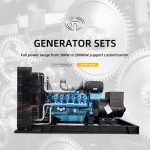Introduction
Diesel generators are crucial power sources for industries, businesses, and residential areas in remote locations or places with unreliable grid power supply. In humid climates, where high levels of moisture in the air can impact equipment performance and longevity, selecting and maintaining a diesel generator requires special considerations. This article aims to explore the challenges posed by humid climates on diesel generators and provide insights into best practices for ensuring optimal performance and reliability in such environments.
Understanding the Impact of Humid Climates on Diesel Generators
Humid climates are characterized by high levels of moisture in the air, which can have several adverse effects on diesel generators. One of the primary concerns in humid environments is the potential for corrosion. The combination of moisture and oxygen in the air can accelerate the corrosion of metal components of the generator, leading to rust and deterioration over time. Corrosion can weaken the structural integrity of the generator and compromise its performance and reliability.
Furthermore, high humidity levels can also promote the growth of mold, mildew, and other fungi in and around the generator. These microorganisms can infiltrate sensitive electrical components, clog air filters, and cause blockages in fuel lines, leading to operational issues and potential breakdowns. In addition, excessive moisture can impact the insulation properties of electrical wiring and components, increasing the risk of electrical faults and short circuits.
Another key concern in humid climates is the impact of high ambient temperatures on the cooling system of diesel generators. As the temperature rises, the cooling efficiency of the generator may decrease, leading to overheating and potential damage to critical components such as the engine and alternator. Inadequate cooling can also reduce the overall efficiency of the generator and result in increased fuel consumption and maintenance costs.
Selecting a Diesel Generator for Humid Climates
When choosing a diesel generator for use in humid climates, several factors must be taken into account to ensure optimal performance and longevity. Here are some essential considerations to keep in mind:
1. Enclosure Design: Opt for a generator with a robust and weatherproof enclosure that provides adequate protection against moisture and environmental contaminants. The enclosure should be constructed from corrosion-resistant materials and feature proper ventilation to prevent the buildup of heat and humidity inside the generator.

2. Cooling System: Select a diesel generator with an efficient cooling system that can effectively dissipate heat even in high ambient temperatures. Consider generators with advanced cooling technologies such as liquid cooling systems or oversized radiators for enhanced thermal management.
3. https://www.lkpowerplant.com/product/special-offer-reliable-high-power-200kw-efficient-diesel-generator-set-for-industrial-use/ : Choose a generator with corrosion-resistant coatings on critical components such as the engine block, alternator, and fuel tank. Stainless steel or galvanized steel materials are ideal for withstanding the corrosive effects of high humidity and salt air in coastal regions.
4. Air Filtration: Prioritize generators equipped with high-quality air filters that can effectively remove moisture, dust, and other contaminants from the intake air. Regular maintenance and replacement of air filters are essential to prevent blockages and ensure optimal airflow to the engine.
5. Fuel Quality: In humid climates, the risk of fuel contamination and microbial growth in diesel tanks is higher. Use fuel stabilizers and biocides to prevent the formation of algae and bacteria in the fuel system. Periodic fuel testing and treatment are essential to maintain fuel quality and prevent engine issues.
6. Electrical Protection: Install proper electrical protection devices such as surge suppressors and voltage regulators to safeguard the generator against power surges and fluctuations caused by lightning strikes or electrical storms common in humid climates.
Best Practices for Maintaining Diesel Generators in Humid Climates
Proper maintenance is key to ensuring the reliable performance and longevity of diesel generators in humid climates. Here are some best practices to follow:
1. Regular Inspections: Conduct routine visual inspections of the generator enclosure, components, and electrical connections to check for signs of corrosion, leaks, or damage. Address any issues promptly to prevent further deterioration.
2. Cooling System Maintenance: Clean and inspect the cooling system components, including radiators, fans, and coolant levels, to ensure efficient heat dissipation. Replace coolant as recommended by the manufacturer and monitor temperature gauges during operation.
3. Air Filter Replacement: Check and replace air filters at regular intervals to maintain optimal airflow to the engine. Clogged filters can restrict air intake and lead to reduced engine performance and increased fuel consumption.
4. Fuel System Cleaning: Periodically drain and clean the fuel tank to remove sediment, water, and microbial contaminants that can affect fuel quality. Install fuel filters and water separators to prevent impurities from reaching the engine.
5. Electrical Connections: Inspect electrical connections, terminals, and wiring for signs of corrosion or moisture ingress. Clean and tighten connections as needed to ensure a secure and reliable electrical supply to the generator.
6. Load Testing: Conduct regular load tests to assess the generator's capacity to handle the required electrical load and identify any performance issues or inefficiencies. Adjust settings or conduct maintenance as necessary to optimize performance.
Conclusion
Diesel generators play a vital role in providing backup power in humid climates where grid power supply may be unreliable or unavailable. To ensure the optimal performance and longevity of diesel generators in such environments, it is essential to consider the impact of high humidity levels on the generator's components and systems. By selecting a generator with appropriate design features, implementing regular maintenance practices, and following best practices for operation and upkeep, users can mitigate the effects of humid climates and maximize the reliability of their diesel generator systems. Adhering to these guidelines will help to safeguard the generator against corrosion, overheating, and other common issues associated with humid conditions, ultimately ensuring continuous and uninterrupted power supply when needed.
